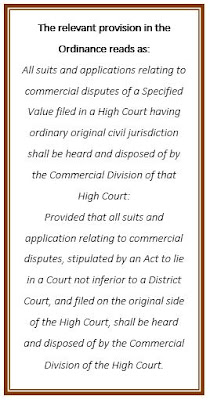Delhi High Court
stays transfer of pending IPR Cases to Lower Courts
In
a recent judgment rendered in the case of Vifor (International) Ltd. v. The High Court
of Delhi and Asian Patent Association (Indian Group) v.
Registrar General, Delhi High Court, the Delhi High Court has
stayed the transfer of pending Intellectual Property Rights cases to the lower courts
irrespective of their pecuniary value.
Background
Pursuant
to the Delhi High Court (Amendment) Act, 2015 (passed under the assent of the
President of India on August 11, 2015), the pecuniary jurisdiction of the Delhi
High Court was raised from INR 2 Million (USD 29,960*) to INR 20 Million (USD
299,601*). As a result, all suits valued below INR 20 Million (USD 299,601*) started
being transferred to the lower courts for lack of pecuniary jurisdiction of the
Delhi High Court. More details on the Delhi High Court (Amendment) Act, 2015
has been covered in our earlier newsletter and can be accessed here.

Thereafter, on October 23, 2015, the Commercial Courts, Commercial Division and Commercial Appellate Division of High Courts Ordinance, 2015 (hereinafter referred to as ‘Ordinance’) was promulgated and brought into force with immediate effect, under which commercial disputes (including Intellectual Property Rights matters) valued at INR 10 Million (USD 1,49,800*) were to be tried by Commercial Courts/ Commercial Division/ Commercial Appellate Division of the High Courts. More details on the said Ordinance has been covered in our earlier newsletter and can be accessed here.
Consequently,
a petition was recently filed before the Hon’ble Delhi High Court seeking stay
on the transfer of Intellectual Property Rights cases from the High Court to
the lower courts inter alia, on the following grounds –
Contentions and
Prayer of the Petitioners in the case
Prayer
In
both the subject cases, the Petitioners had a common prayer that cases arising
out of the Statutes, namely, the Patents Act, 1970, Trade Marks Act, 1999, Copyright
Act, 1957, Designs Act, 2000 and The Geographical Indications of Goods
(Registration and Procedure) Act, 1999 of value less than c are not required to
be transferred in view of the proviso to Section 7 of the aforesaid Ordinance.
Contentions
- That as per the various provisions of the aforesaid five Acts, a suit would not lie in any Court inferior to a District Court.
- That the aforesaid proviso to Section 7 of the Ordinance would show that all suits and applications relating to commercial disputes stipulated by an Act lie in a Court inferior to a District Court, would pertain to the aforesaid Statutes.
- That in case any suit arising out of the aforesaid five IP Acts has already been filed on the Original Side of the High Court, the same is to be heard and disposed of by the Commercial Division of the High Court as per the proviso to Section 7 of the Ordinance. Thus, pending suits arising out of the said five Statutes are to be tried by the Commercial Division of the High Court even if their value is less than INR 10 Million (USD 1,49,800*).
- Additionally, in case an application for amendment of the plaint is filed, the respective Single Judges must hear and consider the same in accordance with law, as there are decisions that an amendment application can be entertained even if the jurisdictional value of the Court has changed (increased or decreased), and such a direction is required as amendment applications are not being accepted by the Delhi High Court’s Registry.
Contention on behalf
of the Respondents
The
Counsel for the Respondent contended that both the matters should be taken up
in January, 2016 as the Ordinance is likely to be replaced by Act in the Winter
Session of the Parliament which might also clear the ambiguities in the
Ordinance.
The Court’s
Observation and Order
The
Delhi High Court (which is also a Respondent in the case), in view of the
consideration that interpretation to proviso
to Section 7 of the Ordinance requires deliberation, ordered that till the
next date of hearing (i.e. January 19, 2016) cases arising out of the aforesaid
five IP Acts shall not be transferred from the High Court to lower courts and
in case application seeking amendment in pecuniary value is filed, they shall
be considered by the respective Single Judges of the Delhi High Court in
accordance with law.
Conclusion
The
entire matter came up in light of Delhi
High Court (Amendment) Act, 2015 which inter
alia amended Section 5(2) of the Delhi
High Court Act, 1966 pertaining to jurisdiction of the Delhi High Court as
aforestated. However, Section 7 of the said Ordinance apparently creates an
exception to the same with respect to commercial disputes. The clarity expected
in the Ordinance would play a pivotal role in determining pecuniary
jurisdiction (and subsequently court fee to be paid) of the Delhi High Court in
cases of IP matters.
*@ 1 USD = 66.76 INR
|

No comments:
Post a Comment